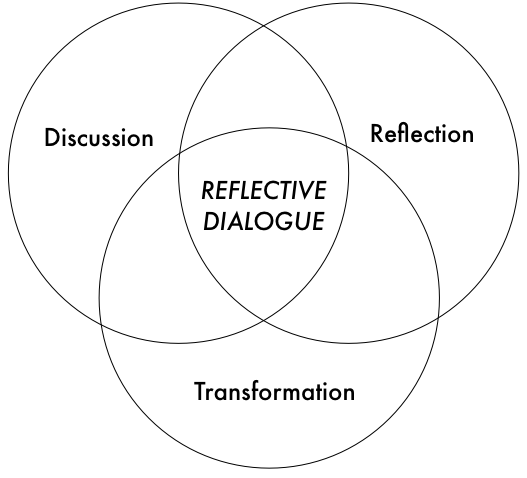Reflective dialogue is a special kind of discussion that can be used strategically in the classroom to build community, expand the capacity for listening, and cultivate individual reflection. To lead a reflective dialogue, the instructor steps back and moderates with a light touch, mainly to ensure that all participants have a chance to share their thoughts and to keep the discussion focused on an established “object” or objects of inquiry, which is used to explore an important theme.
A reflective dialogue opens space for students to work through the intellectual and emotional implications of the content that they are studying, without the pressure for everyone in the room to arrive at the same destination. Reflection (with listening) can be especially productive when students are confronting difficult issues. As Charity Johansson and Peter Felten have explained in Transforming Students: Fulfilling the Promise of Higher Education, “reflective analysis—employing critical thinking, dialogue, and intuitive discernment to examine their assumptions—opens the learner to other possible ways of seeing the world around them and their place in it” (14).
Because reflective dialogue emphasizes both listening to others’ perspectives and listening to one’s self, it can play an important role in supporting the cognitive and emotional development that can make learning a transformational process.
- “Dialogue Principles” (I am sharing these guidelines freely through a Creative Commons license; see the end of the document for details. Feel free to modify or customize it for your own needs.)
- “Teaching with the Trouble: A Reflective Dialogue on Affective Learning,” OPID Spring Conference, April 20-21, 2023, Madison, Wisconsin, co-facilitated with Alison Staudinger.
- Reflective Discussion: Why, Who, When, and How (for facilitators) (shareable PDF)
- General Principles for Participating in Reflective Discussion (1-page, shareable PDF)
- Annotated Resource Guide on Reflective Dialogue and Transformative Education (shareable PDF)
- The Center for Civic Reflection on Reflective Discussion
- Circle of Trust (R) “Touchstones” Handout from the Center for Courage and Renewal (handout for facilitating dialogues)
- Diversity and Social Justice Terminology (this glossary is useful for creating a welcoming environment for all participants in a dialogue)
- Responding to Hate on Campus (APA Convention Symposium 2017) (compilation of resources, including many on “difficult dialogues”)
Acknowledgments:
I thank Kelli Covey, who introduced me to reflective dialogue through the Aldo Leopold Foundation’s Land Ethic Leaders workshop in 2013. I also thank Alison K. Staudinger, with whom I co-directed the Dialogue Fellows program at University of Wisconsin-Green Bay in 2017–18.
